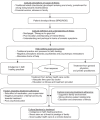Utilization of Cultural Formulation Interview to understand the factors affecting treatment adherence and help-seeking in mood disorders: A qualitative study from Western India
- PMID: 38523770
- PMCID: PMC10956593
- DOI: 10.4103/indianjpsychiatry.indianjpsychiatry_731_23
Utilization of Cultural Formulation Interview to understand the factors affecting treatment adherence and help-seeking in mood disorders: A qualitative study from Western India
Abstract
Introduction: Treatment adherence rates among patients of affective disorders remain sub-par across the world. Sociocultural factors affecting the same remain poorly understood. The current study aimed to explore and conceptualize the same.
Methodology: The study utilized a qualitative grounded and phenomenological approach study design. The patients who fulfilled the Diagnostic and Statistical Manual of Mental Disorders - Fifth edition (DSM-5) criteria of unipolar depression or bipolar affective disorder, and were presently under our treatment for at least three months and currently in remission, aged 18-60 years, and were able to understand Hindi or English, scored less than 6 on the Medication Adherence Rating Scale were included. Furthermore, key caregivers were also included in the study. Using purposive sampling and data saturation, a total of 30 participants were recruited. In-depth interviews were conducted using the cultural formulation interview as given in DSM-5, which was used as the interview tool. Thematic analysis of data was performed using Atlas.ti version 8.4.3.
Results: A total of 14 themes (deductive and inductive) emerging from 171 codes were identified. Some of the important inductive themes included cultural and societal attitude toward illness and treatment-seeking, trust, experience, and expectations from available health care, faith healing-related practices and beliefs. The implicit themes such as cultural understanding of the problem and cultural factors affecting help-seeking, also showed prudent findings.
Conclusion: The study findings demonstrate the various features of the sociocultural milieu and identity of an individual and family that have an influence on treatment-seeking behavior.
Keywords: Bipolar affective disorder; cultural formulation; depression; interview; qualitative; thematic analysis.
Copyright: © 2024 Indian Journal of Psychiatry.
Conflict of interest statement
There are no conflicts of interest.
Similar articles
-
Letter to the Editor: CONVERGENCES AND DIVERGENCES IN THE ICD-11 VS. DSM-5 CLASSIFICATION OF MOOD DISORDERS.Turk Psikiyatri Derg. 2021;32(4):293-295. doi: 10.5080/u26899. Turk Psikiyatri Derg. 2021. PMID: 34964106 English, Turkish.
-
[Female patients with eating disorders and their parents experience in China: A qualitative study].Encephale. 2022 Feb;48(1):43-51. doi: 10.1016/j.encep.2021.01.006. Epub 2021 Apr 16. Encephale. 2022. PMID: 33867140 French.
-
Qualitative content analysis of cultural formulations of clients suffering from conversion disorder in North India.Indian J Psychiatry. 2022 Jan-Feb;64(1):73-79. doi: 10.4103/indianjpsychiatry.indianjpsychiatry_292_21. Epub 2022 Jan 21. Indian J Psychiatry. 2022. PMID: 35400746 Free PMC article.
-
Subjective experience and meaning of delusions in psychosis: a systematic review and qualitative evidence synthesis.Lancet Psychiatry. 2022 Jun;9(6):458-476. doi: 10.1016/S2215-0366(22)00104-3. Epub 2022 May 4. Lancet Psychiatry. 2022. PMID: 35523211
-
ECNP consensus meeting. Bipolar depression. Nice, March 2007.Eur Neuropsychopharmacol. 2008 Jul;18(7):535-49. doi: 10.1016/j.euroneuro.2008.03.003. Epub 2008 May 23. Eur Neuropsychopharmacol. 2008. PMID: 18501566 Review.
References
-
- Demyttenaere K, Bruffaerts R, Posada-Villa J, Gasquet I, Kovess V, Lepine JP. Prevalence, severity, and unmet need for treatment of mental disorders in the World Health Organization World Mental Health Surveys. JAMA. 2004;291:2581–90. - PubMed
-
- Alekhya P, Sriharsha M, Priya Darsini T, Reddy SK, Venkata Ramudu R, Shivanandh B, et al. Treatment and Disease Related Factors Affecting Non- adherence among Patients on Long Term Therapy of Antidepressants. J Depress Anxiety. 2015;4:1000175.
LinkOut - more resources
Full Text Sources

